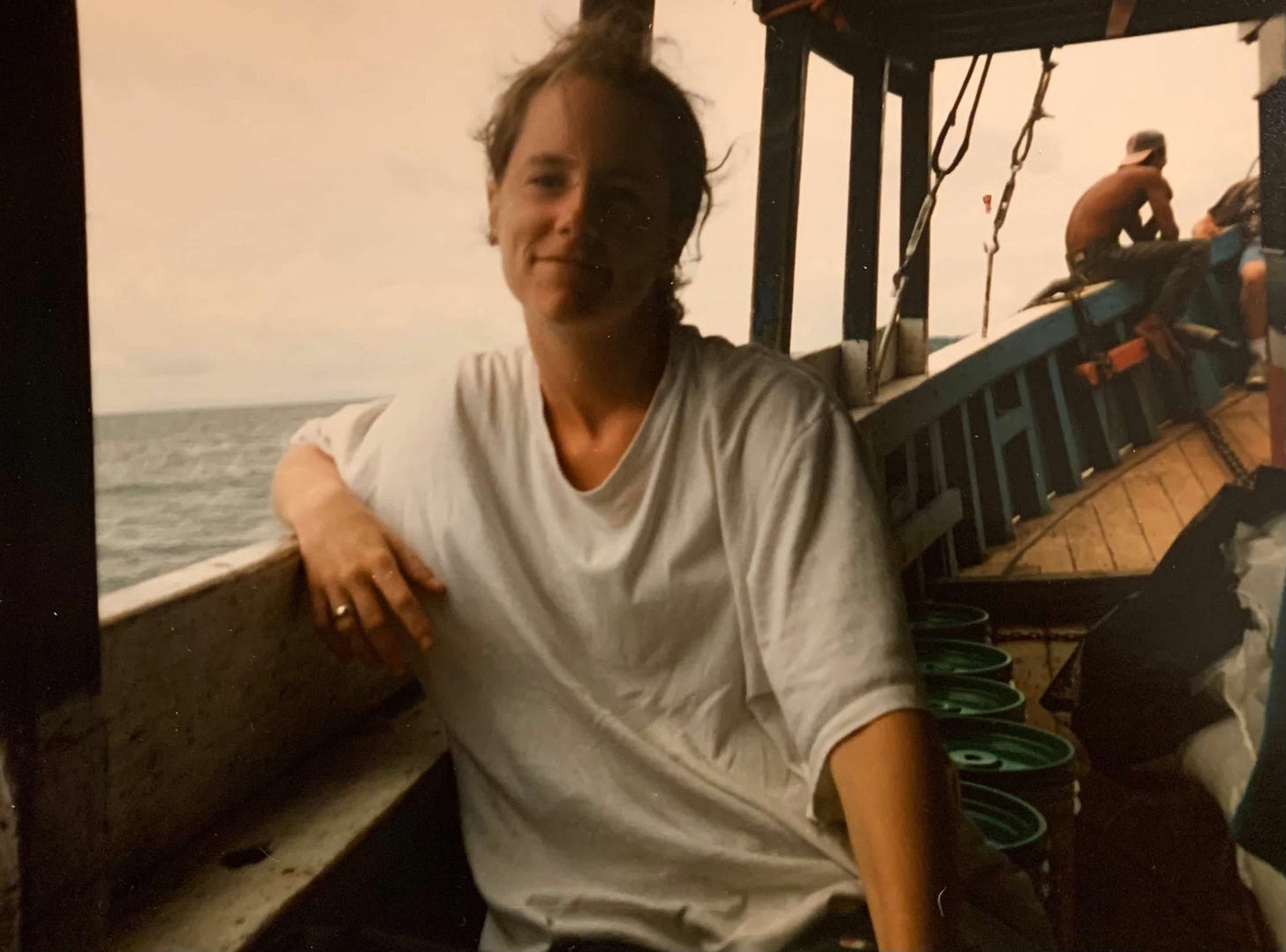I think I was 23 when I met The Internet for the first time. I had just moved to Missoula in the mid-1990s and I was working for a temp agency that sent me to the same business daily for a while. I clearly remember being shown how to use The Internet by someone who came to install it there in the office. This young man patiently demonstrated its operation with the page-by-page clicking, and the now-intuitive back arrow button. It was showy and interesting but what was it for? I didn’t know.
Later that year I went to Nicaragua for the summer and was given an email address at the school where I was teaching – we used the "pine" platform if you recall that – clunky as hell but I could send messages to my parents. After taking a city bus to the lush campus each day, I'd rush to the school library before my class, log on, and check for new messages. It was my first email account and my first experience with the pull of being online.

I mentioned in a previous newsletter how I'd been reading Stolen Focus. The first part of the book describes how it feels to be utterly distracted and overly connected all the time, and how the author detoxes himself…temporarily. The second part of the book explains why it is so hard to remain in that detox state, how our online services mine our data, compile and curate it, and sell it back to us in the form of ads as well as the pure temptation for more and more clicking or scrolling, which is of course how these companies make their money.
The term from this book that most shocked and disgusted me was "surveillance capitalism."1 All the surveillance methods these companies use are not just creepy but I would argue insidious. Evil. And I willingly participate. Do I have an Amazon Echo so I can automatically turn my lights on and off? Yes I do.2 Do I employ gmail, which reads my email and uses it to sell me more shit? Yes I do. And, sadly, I have no fewer than six gmail accounts for all the various crap I engage in.
Even more than the grossness of surveillance capitalism, one particular section of the book touched me in a hard way, like an unpleasant jab in the arm. The author summarizes a conversation with one of his interviewees named Nir Eyal who is a tech designer seeking ways to reduce his own distractibility.
All of us have 'internal triggers' – moments in our lives that push us to give in to bad habits. Nir realized that for him, it's 'when I'm writing—it's never come easy…' When he sat at his laptop and tried to write, he would often start to feel bored or stressed…when that happened, it would trigger something inside him. To get away from these uncomfortable feelings, he would tell himself there was something else he had to do, for just a moment. 'The easiest thing to do would be—let me just check email real quick. Let me just open my phone real quick.'
For me this brings up uncomfortable feelings about my own digital addiction and the role it has played in my adult life. From those days checking for messages from my family in the air-conditioned library at the American-Nicaraguan School to today's compulsive phone-touching, I've certainly degenerated. But the lowest point is what I remember with shame when I read that passage from Stolen Focus.
During my unhappiest adult years, I have found myself disappearing into the screen void, that black hole of attention suck. If I wanted to avoid confronting any unhappiness, I would open that laptop, or pick up the phone, and find something to do. Like the quote above, "let me just do X or Y real quick…" I could distract myself out of thinking about anything hard. It was easier to vanish into an app or pretend to work on a…something…than it was to confront the facts of my life that I didn't like, and do something positive to change those.
It took reading that book, and that particular passage, to make me realize what I’d been doing. I’d already begun to emerge from the sorrows of my life, in no small part due to sweet friends who coaxed me along a journey of appreciating myself and the world around me. And a big part of enjoying one’s surroundings is looking at them, not into a screen.

Many things have improved since those days, a primary change being my willingness to leave the phone at home, or in my bag, often with the sound off. This was borderline unthinkable a decade ago. Nowadays I rarely take it along when I go hiking unless I need it for the AllTrails,3 and I am able to turn it off when I am visiting with others. I do not freak out when I have to be offline for days at a time. I purposely don't have Facebook on my phone because I cannot stop myself from mindlessly scrolling. I do toggle off my work emails so I can't see constant incoming messages when I'm not actually at work, and yes…I'm getting rid of Alexa. (Do you hear that, Alexa? Your days are numbered!)
In general, this book has helped me think about some ways I have been part of the attention economy, a victim of surveillance capitalism, and my own worst enemy. It's hard to see it at first, but once you do, you can't unsee it. It is good to stick a sharp spike in the digital eye of The Man.
Call me a novice if you know this term already. I’m just catching up.
I have two. And I know they listen to me.
Or, you know, I’m hiking alone in the wilderness. Or for birding. The Merlin app is so helpful.




I enjoyed his book a lot, and I’ve slowly removed apps from my phone and silenced notifications and now when I get on social media the noise is pretty much unbearable so I have that inner drive to get back to the quiet. Surveillance capitalism reminds me to Jenny Odell’s “attention economy”.
Have you read Shoshana Zuboff's book "The Age of Surveillance Capitalism"? (I read these things to understand what's actually at stake, what it is we're fighting against.) https://www.hachettebookgroup.com/titles/shoshana-zuboff/the-age-of-surveillance-capitalism/9781610395694/?lens=publicaffairs
I really liked "Stolen Focus." Cory Doctorow is also one of my favorite reads on these subjects because he grounds it all in a deep understanding of capitalism, philosophy, and what's at stake.